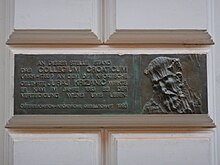Juraj Križanić
Juraj Križanić (also Krizanovic ; * 1618 in Obrh near Ribnik ; † September 12, 1683 in the Battle of Kahlenberg ) was a Croatian theologian , writer , politician and one of the first proponents of Pan-Slavism under Russian leadership.
Križanić was committed to the unification of the Slavs under the leadership of Russia and the Holy See . A revolutionary idea for the time, which remained largely unknown among his contemporaries, as his writings were not published until the 19th and 20th centuries.
Life
Juraj Križanić was born in 1618 as the son of the Croatian nobleman Gašpar Križanić , an officer under Zrinski and his mother Suzane. He attended a Jesuit primary school in Ljubljana , and from 1629 to 1636 the grammar school in Zagreb . In August 1638 he received his MA in Graz (majoring in philosophy) and acquired his theological doctorate at the Collegium Graecum S. Athanasii in Rome in 1642. In his work he mainly devoted himself to the fight against Lutherans and Calvinists .
Early on he tried to find a missionary position in Russia , but initially worked as a teacher at the theological seminary in Zagreb and later as a pastor. Finally, in 1647, Križanić traveled to Russia for the first time, on a Polish mission, and was received in Moscow by Patriarch Iosif . He stayed in Russia until 1650 and later joined an embassy to Constantinople . Between 1651 and 1658 Križanić stayed in Vienna , Rome , and Florence . In 1659 he left for Moscow without papal permission and reached it on September 17th (September 27th) camouflaged as a Ukrainian war refugee. Since he was suspected of being a Catholic agent, he was immediately interrogated. He stated that he wanted to write a history of Russia and a grammar of Church Slavonic and appears to have worked as a librarian and archivist in the Moscow Kremlin . Probably because of his missionary work as a Catholic, Križanić was exiled to Tobolsk in Siberia in January 1661, following an ukase of Tsar Alexei Michajlowitsch , where he stayed until after the death of the Tsar and was very active in literature. His exile lasted until 1676. After that he lived from 1678 to 1681 as a monk in the monastery of the Dominican Order in Warsaw . Until 1683 he stayed in Vilnius and Warsaw. In 1683 he traveled to Vienna, where he assisted the Polish army under the leadership of Jan Sobieski as a chaplain , and in the last major defensive against the Turks on September 12, 1683 he was in the battle of the Kahlenberg near Vienna, which ended the Ottoman siege the city marked, killed. He was buried near Vienna.
plant
Križanić devoted himself to the fight against Calvinism and Lutheranism , but also to the refutation of the writings of the Raskolniki . During his second stay in Russia, he spoke out in favor of a nationwide conversion to Catholicism as well as a union of the Slavic peoples under the leadership of Russia, which he meant to be able to effectively fight Protestantism and the "unbelieving" Turks at the same time .
In his main work Politics, or Conversations about Rule , Križanić advocates absolute monarchy based on classical authorities such as Niccolò Machiavelli . Only a strong Russian monarchy seems to him to be able to represent the interests of both its own, according to him superstitious and undeveloped, population, as well as the other Slavic peoples. Furthermore, Križanić sees the Russian power as pure and unadulterated and warns of the influence of Ukrainian political intrigues and the attrition by the aristocracy, for example in Poland. In addition, a departure from superstition and myths about the origin of Russia is highly necessary, as is that of Greek theology and German technology. Križanić prophesied a significant future for Russia, but warned that the conversion to Catholicism and the liberation and unification of the oppressed Slavs had to take place.
Today Križanić is considered the first theorist and forerunner of political and military Pan-Slavism. He also set an example of later efforts by the Catholic Church to convert Russia. He was also one of the first moralistic advocates of enlightened absolutism . Križanić he left behind a large number of political, theological, linguistic, historical and even musicological writings, most of which were only published in the 19th century.
Fonts (selection)
- Politika ili razgovor ob vladatelystvu (Politics, or Conversations about Rule), 1663–1666
- De providentia Dei , 1666-1667
- Historia de Sibiria , 1680
literature
- James H. Billington : The Icon and the Ax. An Interpretive History of Russian Culture. New York: Vintage Books 1970. ISBN 0-394-70846-6
- Wolfgang Heller: KRIŽANIĆ, Juraj. In: Biographisch-Bibliographisches Kirchenlexikon (BBKL). Volume 4, Bautz, Herzberg 1992, ISBN 3-88309-038-7 , Sp. 670-674.
Web links
- Literature by and about Juraj Križanić in the catalog of the German National Library
| personal data | |
|---|---|
| SURNAME | Križanić, Juraj |
| ALTERNATIVE NAMES | Krizanovic, Juraj |
| BRIEF DESCRIPTION | Croatian theologian and writer; one of the first proponents of Pan-Slavism under Russian leadership |
| DATE OF BIRTH | 1618 |
| PLACE OF BIRTH | Obrh near Ribnik (Croatia) |
| DATE OF DEATH | September 12, 1683 |
| Place of death | Kahlenberg |
